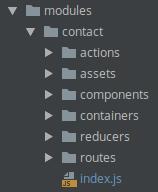Inspired by Mantrajs this package build upons the idea to modulize and abstract.
See the medium article to get the idea behind this.
It's still in pretty early stages. We use this in a few projects to see if it works. If you have further ideas feel free to submit a PR
npm i --save @wertarbyte/module-loaderThe goal is to have one single entrance spot where all modules come together. This package provides the "glue" to attach all together.
It will provide various logics for each module:
- Routes
- Reducers
- Redux Actions
- API calls
The end result could look something like this:
import {createApp} from '@wertarbyte/module-loader';
...
const store = configureStore({}, history);
const context = {
store,
};
const app = createApp(context);
app.loadModule(Core);
app.loadModule(Home);
app.loadModule(Contact);
app.init();
export default () => (
<Provider store={store}>
<MuiThemeProvider theme={theme}>
<ConnectedRouter history={history}>
<Switch>
<Application>{app.routes}</Application>
</Switch>
</ConnectedRouter>
</MuiThemeProvider>
</Provider>
);With that everything is handled. Reducers get injected and routes will be stacked to be used later for the rendering pipeline.
There is currently no limitation on how many modules can be loaded.
In order to inject reducers dynamically we need asyncReducers which basically just means a hook for the module loader.
Note how we add asyncReducers in the createReducer method and add them dynamically in store.injectReducer when a new module is loaded.
import {applyMiddleware, combineReducers, compose, createStore} from 'redux';
import {routerMiddleware, routerReducer} from 'react-router-redux';
export const createReducer = asyncReducers =>
combineReducers({
routing: routerReducer,
...asyncReducers,
});
export default function(initialState, browserHistory) {
const routermw = routerMiddleware(browserHistory);
return createStore(
createReducer(),
initialState,
process.env.NODE_ENV !== 'production' && window.devToolsExtension
? compose(applyMiddleware(routermw), window.devToolsExtension())
: compose(applyMiddleware(routermw)),
);
}Every module has an index.js in its root to expose the inner parts.
Let's assume our module contact has:
- actions as an array
- reducers
- routes as a function
import {createModule} from '@wertarbyte/module-loader';
import * as actions from './actions';
import reducers from './reducers';
import routes from './routes';
export default createModule('contact', { actions, reducers, routes });Load modules, init the app and mount your modules to get started
import {createApp} from '@wertarbyte/module-loader';
import configureStore, {createReducer} from './configureStore';
...
const store = configureStore({}, history);
const app = createApp({
store,
replaceReducers: (reducers) => {
store.replaceReducer(createReducer(reducers));
},
});
app.loadModule(Core);
app.loadModule(Home);
app.loadModule(Contact);
app.init();
export default () => (
<Provider store={store}>
<MuiThemeProvider theme={theme}>
<ConnectedRouter history={history}>
<Switch>
<Application>{app.routes}</Application>
</Switch>
</ConnectedRouter>
</MuiThemeProvider>
</Provider>
);| Name | Type | Description |
|---|---|---|
| createApp | func |
Returns an app instance to load modules. |
| createModule | func |
Returns an module instance for creating a new module. |
| Name | Type | Description |
|---|---|---|
| checkForInit | func |
Throws error message if app is already initialized. |
| init | func |
Set flag that app is initialized. |
| loadModule | func |
Loads a module. |
| Name | Type | Default | Description |
|---|---|---|---|
| actions | object |
{} | Defines the actions. |
| api | object |
{} | Defines the API calls. |
| loaded | boolean |
false | Defines if the module has already been loaded once. |
| name* | string |
Defines a unique name. | |
| reducers | func |
null | Defines the reducers. |
| routes | func |
null | Defines the routes. |
